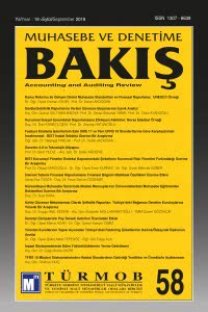YÖNETİM MUHASEBESİNDEKİ DEĞİŞİM VE DEĞİŞİMİ ETKİLEYEN FAKTÖRLER
Stratejik Yönetim Muhasebesi, Stratejik Maliyet Yönetimi, Yönetim Muhasebesindeki Değişim
___
- Altuğ, O. (2006); “Maliyet Muhasebesi”, Türkmen Kitabevi, 14. Baskı, İstanbul.
- Bhimani, A.; Horngren, C.; Datar, S.; Foster, G. (2008); “Management and Cost Accounting”, Forth Edition, Prentice Hall, UK.
- Blocher, E.J.; Stout, D.; Cokins, G.; Chen, K.H. (2008); “Cost Management: A Strategic Emphasis”, Forth Edi- tion, McGraw-Hill International Edition, USA
- Burns, J.; Vaivio, J. (2001); “Management Accounting Change”, Management Accounting Research, Volume 12 (4).
- Büyükmirza, K. (2008); “Maliyet ve Yönetim Muhasebesi: Tekdüzen Uygun Bir Sistem Yaklaşımı”, Gazi Kitabe- vi (12. Baskı), Ankara
- Dixon, R. (1998); “Accounting for Strategic Management: A Practical Application”, Long Range Planning, Vol. , No:2.
- Drury, C. (2008); “Management and Cost Accounting”, Seventh Edition, South Western Cegage Education, UK.
- Edmonds, T.; Edmonds, C.; Yi Tsay, Bor (2000); “Fundemental Managerial Accounting Concepts”, McGraw- Hill, USA.
- Fleischman, R.; Funnel, W. (2007); “The Relevance of The Past”, Issues in Management Accounting, Third Edi- tion, (Edited by Hopper, T.; Northcott, D.; Scapens, R.), Prentice Hall, UK.
- Glautier, M.W.E.; Underdown, B. (2001); “Accounting Theory and Practice”, Seventh Edition, Prentice Hall, UK.
- Granlund, M. (2007); “On the Interface Between Management Accounting and Modern Information Technology
- – A Literature Review and Some Empirical Evidence”, Working Paper, http://ssrn.com/abstract=985074
- Gürsoy, C.T. (1999); “Yönetim ve Maliyet Muhasebesi”, Beta Basım Yayım Dağıtım, 2.Bası, İstanbul.
- Hacırüstemoğlu, R.; Şakrak, M. (2002); “Maliyet ve Yönetim Muhasebesinde Güncel Yaklaşımlar”, Türkmen Ki- tabevi, İstanbul
- Hoque, Z. (2006); “Strategic Management Accounting: Concepts, Process and Issues”, Second Edition, Pearson Education, Australia.
- Huntzinger, J. (2007); “Lean Cost Management: Accounting for Lean by Established Flow”, J.Ross Publishing, USA.
- ICAEW (2004); “New Reporting Models”, The Institute of Chartered Accountants in England and Wales, A Fi- nance & Management Special Report, UK.
- Islam, M.; Kantor, J. (2005); “The Development of Quality Management Accounting Practices in China”, Ma- nagerial Auditing Journal, Volume 20, No 7, (www.emeraldinsight.com/0268-6902.htm)
- Kaplan, R.S.; Atkinson, A.A. (1998); “Advanced Management Accounting”, Third Edition, Printice Hall.
- Koçel, T. (2005); “İşletme Yöneticiliği”, Arıkan Basım Yayım Dağıtım, 10.Baskı, İstanbul
- Laitinen, E.K. (2003); “Future-Based Management Accounting: A New Approach with survey Evidence”, Criti- cal Perspectives on Accounting, Volume 14, Elsevier.
- Landry and Chan (1999), “Making the New Transition form Functional Cost Center “Big Brother” To Value Ad- ding Key Team Member: A Paradigm for the Changing Role of Management Accountants in a Customer-Focu- sed, Quality-Driven, Value-Added World”, The Role of Management Accounting in Creating Value, Issued by the International Federation of Accountants, New York, USA.
- Lukka, K. (2007); “Management Accounting Change and Stability: Loosely Coupled Rules and Routines in Ac- tion”, Management Accounting Research (18).
- Morse, D.; Zimmerman J. (1997); “Managerial Accounting”, McGraw-Hill, USA.
- Nobes, C.; Parker, R. (2006); “Comparative International Accounting”, (9th Edition), Prentice Hall.
- Rom, A.; Rohde, C. (2007); “Management Accounting and Integrated Information Systems: A Literature Revi- ew”, International Journal of Accounting Information Systems (8).
- Scorgie, M.E. (2001); “Progenitors of Modern Management Accounting Concepts and Mensurations in pre-in- dustrial England”, The History of Accounting: Critical Perspective on Business and Management, (Edited by John Richards Edwards), Volume III Cost and Management Accounting, Routledge.
- Waweru, N.M.; Hoque, Z.; Uliana, E. (2004); “Management Accounting Change in South Africa”, Accounting,
- Auditing & Accountability Journal, Volume 17, No 5, (www.emeraldinsight.com/0951-3574.htm)
- Yalkın, Y.K. (1989); “Yönetim Aracı Olarak İşletme Bütçeleri”, Turhan Kitabevi, 3.Baskı, Ankara.
- ISSN: 1307-6639
- Yayın Aralığı: 3
- Başlangıç: 2000
- Yayıncı: TÜRMOB
KALİTE MALİYETLERİ VE YAŞAM BOYU MALİYETLEME YÖNTEMİ
ÇALIŞAN MORALİ VE İŞTEN AYRILMA İSTEĞİ: MUHASEBECİLİK MESLEĞİ ÜZERİNE BİR ARAŞTIRMA
Ali Ender ALTUNOĞLU, Başak ÇATALOĞLU, Algın OKURSOY
RİSK ODAKLI İÇ DENETİM: TÜRKİYE’NİN 500 BÜYÜK SANAYİ İŞLETMESİNDE AMPİRİK BİR DEĞERLENDİRME
Hüseyin ERGİN, Tansel ÇETİNOĞLU, Niyazi KURNAZ
Şakir SAKARYA, H İbrahim ÖZMEN
YÖNETİM MUHASEBESİNDEKİ DEĞİŞİM VE DEĞİŞİMİ ETKİLEYEN FAKTÖRLER
